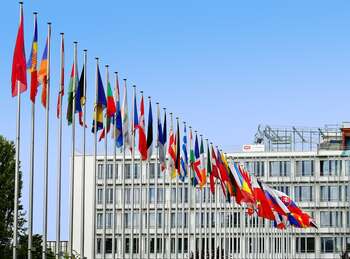Getting lost on the road to EU Expansion
 The history of the European Union, if anything, can be written in chapters - a winding road replete with growth, retraction, adversity and triumph. However, with some exceptions, the past two decades have perhaps been the most stable and peaceful period the continent has ever known.
The history of the European Union, if anything, can be written in chapters - a winding road replete with growth, retraction, adversity and triumph. However, with some exceptions, the past two decades have perhaps been the most stable and peaceful period the continent has ever known.
Much of this has been due to the peaceful, economically symbiotic EU absorption of most of Europe. However, while much has been made of recent talks to expand - most notably in the direction of Ukraine - enlargement is a complex, evolving process - and one with many off-ramps on the path to accession.
2004 Enlargement: The A8 Nations Join
On May 1, 2004, eight nations joined the EU in what was the largest single expansion of membership in its history. The Czech Republic, Slovakia, Poland, Hungary, Slovenia, Estonia, Latvia and Lithuania, dubbed the 'A8' or 'Accession 8', relatively quickly followed by Bulgaria and Romania in 2007.
Perceptions of these 'new' Europeans were mixed across founding states. There were real concerns about the EU's capacity to handle such a rapid near-doubling in size, as well as worries that fast-growing, low-cost economies could create pressure on mature Western service economies through a deluge of cheaper exports and workers.
The sweet truth – with cavities
These fears were largely proven unfounded. The Eastern countries had already liberalised foreign trade, and while the impact hasn't been perfect, it hasn't been the continuous economic brain drain that naysayers suggested. Enlargement overall brought the poorest new members only to around 80% of the EU average income level through cohesion policies, but avoided crippling existing members.
Ukraine's application stresses geopolitics
While difficult to predict if the EU will continue growing, Russia's aggression in Ukraine has revealed the limits of the EU's soft power and accelerated a shift towards the geopolitical value and necessity of integration.
In response to the invasion, Kyiv lodged a membership application, expecting to hear on candidate status at the European Council's June 2023 meetings. The EU has supplied Ukraine militarily from existing stocks, but it's sometimes hard to be hopeful the 27 will fully support Ukraine before it's too late.
Obstacles and Reform Efforts
Twenty years after opening the door to the Western Balkans' EU future at the 2003 Thessaloniki Summit, progress has been slow. Some countries struggled with reforms, rule of law, and good neighbourly relations requirements.
This spurred a 2018 EU strategy reaffirming the region's European perspective as a geostrategic investment and targeting 2025 for possible accession. However, EU delays in opening accession talks with Albania and North Macedonia despite positive recommendations fuelled nationalist rhetoric and opened the door to third-country influencers like Russia and China.
This ‘enlargement fatigue’ forced a reform of accession policies in 2020 centred on:
- A revised, merit-based negotiation process giving EU states more oversight
- Prioritising key reforms like rule of law and democratic institutions upfront
- Greater third-country integration before full membership
The war in Ukraine accelerated this direction, with a 2022 European Council invite to ‘gradually integrate’ candidates with the EU during the accession process itself in a ‘reversible, merit-based manner.’
Reforms: the keystone for stalled accession
Looking ahead, while the EU's 2020 revised methodology stresses geopolitical factors, success still depends heavily on candidates' internal reforms. The Commission's 2023 recommendations urge speeding up the Western Balkans process and opening talks with Ukraine and Moldova.
However, it dings Serbia for insufficient alignment on EU foreign policy, notably refusing to sanction Russia. Bosnia's secessionism and Kosovo's stalled movement on Serb minority rights are also obstacles.
Conversely, Ukraine has implemented over 90% of required steps, while Moldova and Georgia have made significant EU alignment strides, prompted perhaps by the very real security concerns driving their membership bids.
Budget, Policy, and Governance Impacts
Expanding the bloc will require budget increases to fund new members' cohesion and agricultural policies. Estimates suggest accession of current candidates could cost €256.8 billion over 7 years, necessitating reforms like capping transitional payments and seeking reconstruction aid from international lenders.
Policy areas like trade show the two-way benefits, with new single market access helping rebalance the EU's rising trade surpluses with candidates. However, integrating Ukraine's vast farmlands could overwhelm the current farm subsidy system without major reform.
More broadly, as highlighted in a 2023 report spotlighting shortfalls in EU citizens’ expectations, equipping EU institutions for further growth may require moving away from unanimity voting, linking payments to rule of law adherence, establishing new budgetary resources, and enhanced financial integrity oversight.
The road ahead
The European Parliament has firmly backed opening accession pathways for Ukraine and Moldova in 2023 as a geostrategic shift towards getting bigger – or at least having more trade partners. However, there are caveats that could delay, derail or otherwise spotlight the enlargement process as either unwanted or undoable. The continued emphasis of the merit-based nature of approval, for instance, is arguably more than a bit opaque, may lead to exhaustion – leading to a situation where everyone goes home and plays their own game instead.
Ultimately, while Russia's invasion dramatically escalated the EU's geopolitical impetus, delivering on true, gradual integration will require sustained domestic transformation anyone on the ‘serious’ list for candidacy. History teaches lessons, and one of these is that all the funds in the world cannot cure corruption and ineffective government. In the instant case, as the European trail stretches further eastward, the road will likely only grow more winding, but the benefits for single market may make the trip worth it.




